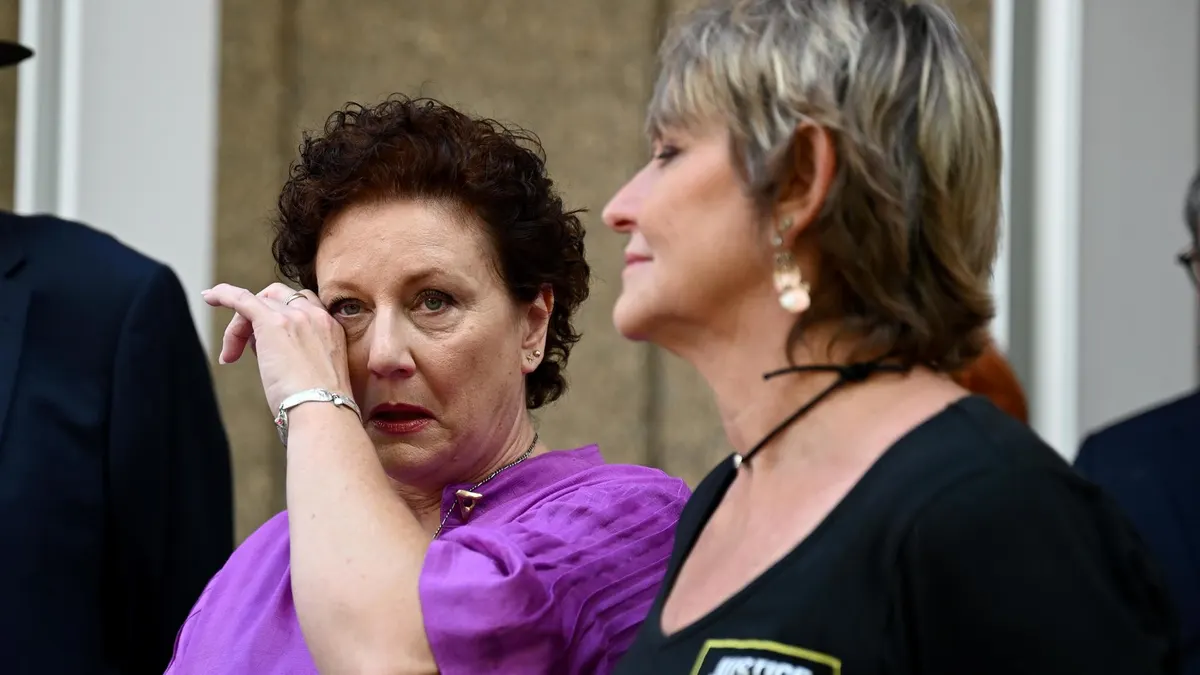
An Australian court has convictions annulled imposed on Kathleen Folbigg, the woman who He spent two decades in prison for the alleged murder of her four babies and was pardoned last Juneafter a review of his case determined that there was reasonable doubt about his guilt.
“There is reasonable doubt about Ms Folbigg’s guiltwhich justifies that each of the convictions (for three counts of murder and one of involuntary manslaughter) be annulled and that acquittals be handed down,” maintains the court ruling, issued this Thursday by the New Wales Court of Criminal Appeal of the South.
The case of this 56-year-old Australian was reopened in 2021 following a research coordinated by a Spanish scientist that linked the deaths of the children to genetic errors. Folbigg was sentenced in 2003 to 40 years of prison, reduced to 30 years in 2005, for the death of his children Caleb, Patrick, Sarah and Laura between 1989 and 1999, when they were between 19 days and 18 months old.
“I hoped and prayed that one day I could be here with my name cleared,” he said now from Sydney, after learning of the court decision. “The system preferred to blame me instead of accepting that, sometimes, children can and do die suddenly, unexpectedly and heartbreakingly,” lamented Folbigg, who was accused of ‘Australia’s worst serial killer’.
By asking that both the system and society reflect “before blaming parents for harming their children,” the woman hoped that “no one else has to suffer” the same thing.
“Reasonable doubts” about his guilt
The overturning of the conviction is supported by the findings of Judge Tom Bathurst’s review of the case, which concluded that there had been “reasonable doubts” about his guiltwhich motivated the governor of New South Wales to sign the pardon. Folbigg was released, while Bathurst referred the case to the Court of Appeal to quash the convictions or order another trial.
This court has now agreed with Bathurst on the data provided by the new scientific evidence in this case, as well as the conclusion that Folbigg’s diary entries, which were used to frame her, “were not reliable admissions of guilt.”
Folbigg was grateful that genetics and scientific advances had given him answers about the death of his children, but he regretted that in 1999 his defense had “legal answers to prove my innocence” that “were ignored and dismissed.”
“The suffering of an innocent woman can and must be recognized and become an important impetus to improve our judicial system,” declared lawyer Rhanee Rego in statements collected by the public channel ‘ABC’, in which she has advanced that will ask for “substantial” compensation for Folbigg.
Although the sum is unknown, there is the precedent of the case ofLindy Chamberlain and her ex-husband Michaelpardoned for the death of their daughter Azaria after their convictions were annulled in 1988. The couple, whose baby was stolen by a dingo, were compensated in 1992 with 1.3 million Australian dollars (about 800,000 euros), according to the newspaper ‘Sydney Morning Herald’.
The role of a Spanish scientist
The case of Kathleen Folbigg was reopened following a letter sent in 2021 to the Australian authorities by a hundred scientists – including two Nobel Prize winners – to request clemency and her immediate release.
The trigger was the conclusions reached in 2020 by a team of scientists, coordinated by the Spanish immunologist Carola García de Vinuesa and led by the Danish Michael Toft Overgaard, who pointed out that The deaths of the Folbigg babies could be due to genetic causes.
Furthermore, the study, made up of an international team of 27 scientists, found that the children carried rare variants of a gene that kills rodents by epileptic seizures.
“It is very good news and a reminder that the judicial system needs to listen more to science, and value more the contribution of genomic medicine to understand the cause of sudden death and rare diseases, before blaming mothers,” the Spanish scientist indicated to the Efe agency, after hearing the court ruling.
Source: Lasexta
Ricardo is a renowned author and journalist, known for his exceptional writing on top-news stories. He currently works as a writer at the 247 News Agency, where he is known for his ability to deliver breaking news and insightful analysis on the most pressing issues of the day.












